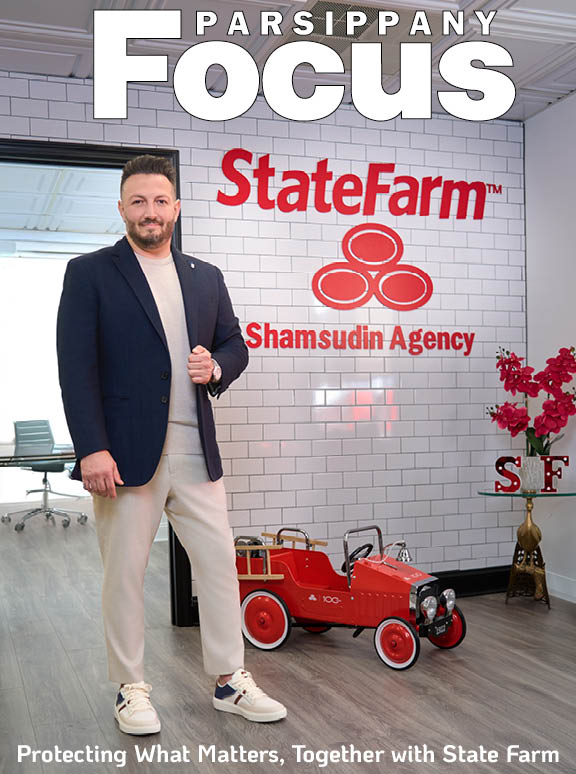PARSIPPANY — Mayor James Barberio violated New Jersey public and campaign finance laws by distributing a political flyer marketed as a newsletter, prominently featuring his campaign talking points and paid for by the Township of Parsippany-Troy Hills. Barberio’s name appears about a dozen times in the four-page glossy mailer.
Parsippany Focus conducted a survey of residents throughout Parsippany, and every resident contacted received the mailer, which was addressed “Resident at their home address.”

The flyer, mailed to households across Parsippany, amounts to the Mayor funding his campaign with taxpayer dollars. This is a clear violation of the 90 Day Rule (N.J.A.C. 19:25-10.10(b)), which stipulates that “political communications” cannot be sent by the municipal government within 90 days of an election. Specifically:
- The communication cannot be made within 90-days of any election involving the candidates (clear violation, less than 35 days before the election).
- The recipients may not be substantially made up of individuals eligible to vote for the candidate (clear violation, sent to households across Parsippany).
- The communication may not refer to the governmental objectives or achievements of the candidate (clear violation, multiple paragraphs on these topics).
- The communication may not be done with the cooperation or consent of the candidate (clear violation, issued by Mayor Barberio’s administration).
Michael Soriano, candidate for Mayor of Parsippany, has filed an Open Public Records Act request to determine the exact amount of taxpayer dollars spent to prepare, print and mail this publicly-funded campaign material.
Michael Soriano stated, “On behalf of the taxpayers of Parsippany, I am demanding that Mayor Barberio immediately reimburse the township for all expenses incurred in the production of this flyer.”
He added, “This is exactly the kind of mismanagement and waste that inspired me to run for office. This sort of behavior, violating the trust of Parsippany’s taxpayers, has been emblematic of Mayor Barberio’s administration. Calling out this behavior for all to see is the first step in cleaning up Parsippany.”
Parsippany Focus also filed an Open Public Records Act (OPRA) requesting:
- All invoices, purchase orders, emails, correspondence regarding the creation (writing of stories, photographs) of the 4-page newsletter mailed to Parsippany residents on or about October 5, 2017. If a township employee contributed to the creation, all time sheets showing name, hours spent on project;
- All invoices, purchase orders, emails, correspondence regarding the printing of the 4-page newsletter mailed to Parsippany residents on or about October 5, 2017. If a township employee contributed to the creation, all time sheets showing name, hours spent on project;
- All invoices, purchase orders, emails, correspondence regarding the graphic design of the 4-page newsletter mailed to Parsippany residents on or about October 5, 2017. If a township employee contributed to the graphic design, all time sheets showing name, hours spent on project;
- All invoices, purchase orders, emails, correspondence regarding the mailing, including postage receipts, of the 4-page newsletter mailed to Parsippany residents on or about October 5, 2017.
OPRA requests are required to be answered within seven working days, not counting the day submitted, weekdays or holidays. Our request was submitted to the Township Clerk on October 6, and we should receive a response by October 18.
Mayor James Barberio did not answer a request for comments for this story.
In 2014, Bergen County Executive Kathe Donovan, ran into the same issue with “Bergen Blast,” printed by the county and posted on its website. It talked about what Donovan has done for seniors, about how she “delivers healthy alternatives to Bergen County,” how she’s “taking action” to help those with mental health problems. The newsletter — which was set to be distributed to libraries, lobbies, senior centers and veterans homes in the county’s 70 towns — was illegal because Donovan was up for re-election in November.
New Jersey’s law considers many types of communications political if they’re made within 90 days of the election, and therefore counted as in-kind contributions. But it’s illegal for public entities to give political contributions to campaigns. At the time, Donovan’s office dropped its plans to distribute the newsletter and removed it from the internet. Donovan personally reimbursed the county the cost of printing the newsletter.
The New Jersey Election Law Enforcement Commission Former chairman Ronald DeFilippis, the longest-serving chairman in ELEC’s history, who resigned July 21 previously issued comments regarding the 90-day rule, or the political communication regulation.
The 90-day rule, or the political communication regulation, is effective under the following conditions:
1. When the communication is made within 90-days of any election involving the candidates;
2. When the recipients are substantially comprised of individuals eligible to vote for the candidates;
3. When the communication refers to the governmental objectives or achievements of the candidate; and,
4. When the communication is done with the cooperation or consent of the candidate.
In the majority of cases, the rule has applied to communications produced by a governmental body such as a municipal, county, or state government agency.
If the above conditions are met, the cost of producing and disseminating the communication would be an in-kind contribution from the governmental body to the candidate.
This expenditure would be required to be disclosed by the candidate as an in-kind contribution.
While the Commission is authorized to enforce disclosure of this activity, it does not, however, have jurisdiction over the issue of the legality of using taxpayer funds for this purpose.
As with any law or regulation there are exceptions. For example, there is no requirement to report a communication by an incumbent officeholder seeking re-election if the communication is in writing and is made to a constituent in direct response to a prior communication from the constituent.
The 90-day rule applies to all candidates running for public office, including fire district and school board candidates.
The Commission’s staff is available to assist with questions related to the 90-day rule. Staff can be reached at (888) 313-3532.
Requests for advisory opinions can be submitted in writing to the Commission at ELEC, P.O. Box 185, Trenton, NJ 08625. For copies of this report click here.
Information is also available by clicking here.















